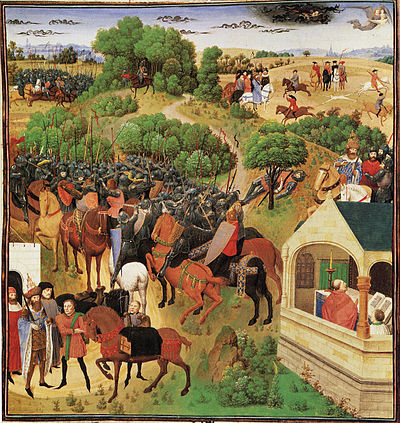
Back Chanson de geste Afrikaans أغنية البطولة Arabic Kurwerz Breton Cançó de gesta Catalan Chansons de geste Czech Chansons de geste Danish Chanson de geste German Επικό άσμα Greek Epika kanto Esperanto Cantar de gesta Spanish
This article needs additional citations for verification. (October 2021) |

The chanson de geste (Old French for 'song of heroic deeds',[a] from Latin: gesta 'deeds, actions accomplished')[1] is a medieval narrative, a type of epic poem that appears at the dawn of French literature.[2] The earliest known poems of this genre date from the late 11th and early 12th centuries, shortly before the emergence of the lyric poetry of the troubadours and trouvères, and the earliest verse romances. They reached their highest point of acceptance in the period 1150–1250.[3]
Composed in verse, these narrative poems of moderate length (averaging 4000 lines[4]) were originally sung, or (later) recited, by minstrels or jongleurs. More than one hundred chansons de geste have survived in approximately three hundred manuscripts[5] that date from the 12th to the 15th century.
Cite error: There are <ref group=lower-alpha> tags or {{efn}} templates on this page, but the references will not show without a {{reflist|group=lower-alpha}} template or {{notelist}} template (see the help page).
- ^ Crosland, 1.
- ^ France, Peter (1995). The new Oxford companion to literature in French. Clarendon Press. ISBN 0198661258.
- ^ Hasenohr, 242.
- ^ Holmes, 66.
- ^ La Chanson de Roland, 12.